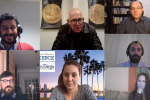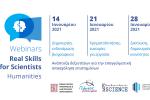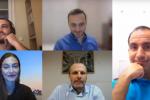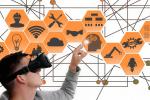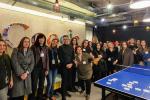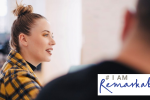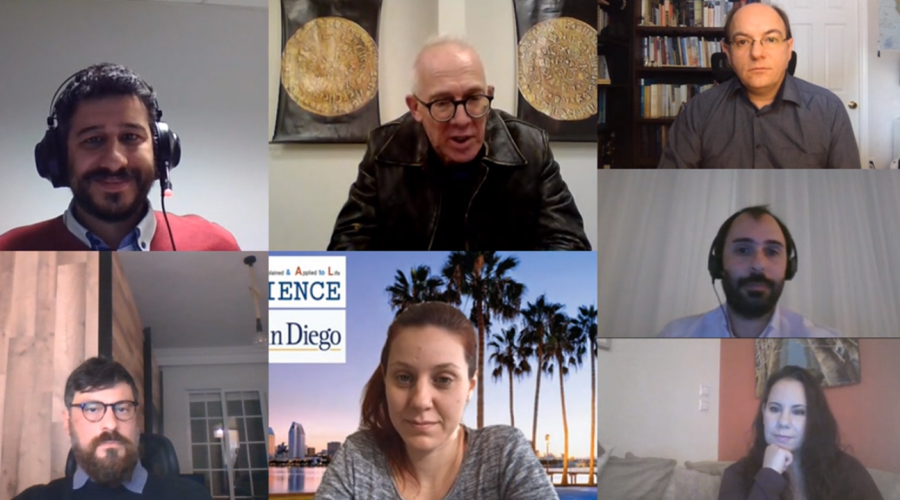
Twelve renowned speakers in the field of the Humanities from Greece and abroad shared their experiences and knowledge with about 1,900 young Greek and Cypriot scientists from 20 countries as part of the 3rd series of webinars Real Skills For Scientists.
The successful third series of webinars, Real Skills for Scientists – Humanities, organised by the National Documentation Centre (EKT) under the 'Knowledge and Partnership Bridges' initiative, in collaboration with R.E.A.L. Science and the Cyprus Research and Innovation Foundation, was well attended by young researchers from all over Greece who showed great interest. After the first two series in Life Sciences and Computer Science, the third one focused on the Humanities. In the three webinars of the series, which aimed to develop personal skills for the professional careers of young researchers and scientists in the field of Humanities, participants had the opportunity to hear useful advice and question by experienced and renowned researchers from Greece and abroad.
The response was overwhelming, as approximately 1,900 undergraduate and postgraduate students, PhD candidates, postdoctoral fellowships, faculty members, teachers, students and researchers attended the webinars. The audience consisted of Greeks and Cypriots who connected not only from their homeland, but also from 18 additional countries such as Germany, United Kingdom, Italy, Sweden, Switzerland, the Netherlands, Canada, Mexico - professionals, students and researchers working and/or studying abroad.
1st Webinar: Creating and enhancing a Resume
The 3rd series started on January 14, 2021 with 4 young scientists from the Humanities, who have professional careers in academia and the private sector. Dr. Artemis Georgiou, postdoctoral researcher at the American Archaeological Institute of Cyprus & ERC Grantee 2020, Dr. Nikos Manousakis, researcher at the Academy of Athens, National and Kapodistrian University of Athens, Dr. Maria Kaliabou, Senior Lecturer in the Greek Studies Programme at Yale University and Stella Kasdagli, co-founder of the non-profit organisation Women On Top and author, talked about their experiences and ways to boost resumes, the conditions that must be met for a professional career. the particular characteristics of the Humanities in relation to other sciences, the importance of internships, voluntary work and mobility programmes.
During her presentation, Dr. Artemis Georgiou talked about the ways in which the Humanities promote rational thinking; scholarships, mobility programmes, and the conditions to be met in order to become a grantee. She also presented ways for Cypriot students to learn foreign languages free of charge and pointed out the skills that are most important and should be cultivated by students, with an emphasis on interdisciplinarity, ie the development of parallel skills to combine more than one science. His own path as a philologist, assistant director and, finally, as a researcher at the Academy of Athens, was presented by Dr. Nikos Manousakis. He explained how he combined artificial intelligence and computational linguistics with classical literature and gave young researchers guidance, emphasising that there are no physical boundaries between research and scientific fields. He presented the failures that young scientists often encounter as an opportunity that they should take advantage of.
The importance of mobility programmes, such as Erasmus, was presented by Dr. Maria Kaliambou, who stressed the catalytic role they played in her own life, helping her to create a unique network of contacts and, ultimately, to make her dream of studying folklore/ethnology a reality. She also encouraged young researchers to participate early in internships, publications and conferences, in order to create and/or expand their network of contacts. In addition, she highlighted the points of a CV that the young professional should emphasise such as education, professional activity, publications, conferences and teaching.
Finally, Stella Kasdagli presented her own path in the Humanities, from translator to the founding of Women On Top, which helps young scientists taking their first steps and want guidance from other women with more experience. She raised the issue of gender equality and the representation of women in science and the public sphere and gave guidance to young professionals working in a job they do not like.
Watch the video from webinar 1: Creating and enhancing a Resume
2nd Webinar - Funding and employment opportunities
The second webinar, which took place on January 21, 2021, provided useful tips and information on funding sources. Participants were university professors and researchers who manage or have benefited from research programmes or scholarships. They included, Dr. Georgia Kipouropoulou, Academic Researcher focusing on Agricultire from the School of Agricultural Sciences of the University of West Macedonia, Dr. Fotini Asderaki, Associate Professor in the Department of International and European Studies, University of Piraeus, Dr.Katerina Plakitsi, Professor and President of the Department of Early Childhood Education, University of Ioannina and Co-ordinator of the research unit Formal and Informal Science Education, and Dr.Athena Kornelaki, Postdoctoral Researcher in the Department of Early Childhood Educarion, University of Ioannina.
Dr. Georgia Kipouropoulou presented her own career in Philology and Agriculture, as a Historian who studies agriculture using new technologies, thanks to her own perseverance and the IKY scholarship awarded to her. She encouraged young researchers to dare to combine different sciences, to enrich their CV with professional experiences and seminars and to apply for scholarships.
Professor Fotini Asderaki, as Academic Co-ordinator of various Jean Monnet and Erasmus programmes and evaluator of European programmes and awards, advised students and young professionals to take advantage of the opportunities presented by various programmes of the University of Piraeus, summer schools and of IKY, ELIDEK and the Onassis Foundation awards, and encouraged them to participate.
Referring to the difficulties, she faced during her first years when trying to find funding for the students of the department of Early Childhood Education, University of Ioannina, Professor Katerina Plakitsi talked about the strategic collaborations that ultimately yielded results, for undergraduate and postgraduate students, research staff and practising teachers today. She also presented the programme '21st Century Teaching Skills-21stTS' co-ordinated by the University of Ioannina as part of the Erasmus + programme, which concerns the exchange of know-how between educators from Europe and remote regions of Asia such as China, India and Cambodia. She urged young researchers to get in touch with the research unit Formal and Informal Science Education, which she co-ordinates, and to seek more information about ongoing research projects.
Dr. Athena Kornelaki, a postdoctoral researcher in the Department of Early Childhood Education investigating Science Education in early childhood, explained how mobility programmes enhanced her career, while the scholarship from IKY helped her devote herself to it.
Watch the video from webinar 2: Funding and employment opportunities
3rd Webinar – Networking and creating community
The third and final webinar took place on January 28, 2021 and focused on networking and building a community of scientists as a career tool. Speakers in this webinar were Valia Loutrianaki, philologist at Arsakeio Psychiko and President of the Hellenic Association for the Promotion of Rhetoric in Education, Dr. Gareth Owens, Linguist and Erasmus + Co-ordinator at the Hellenic Mediterranean University, Theodoros Rakopoulos, Assoc. Professor of Anthropology at the University of Oslo and Dr. Sakis Gekas, Assoc. Professor of Greek and European History at the University of Toronto.
The first to speak was Valia Loutrianaki, who referred to the strength of a group, ie a small community that should be characterised by harmony, equality but not homogeneity, so that all of its members benefit from the differences. Valia Loutrianaki explained that with the help of a team can someone contribute to the society, enhance his/her knowledge, better find his/her place within the team and society and set his/her professional goals.
Dr. Gareth Owens talked about his own path in the Humanities, the opportunities he seized in order to come to Greece and study Minoan Linear A at the University, having received an IKY scholarship. He compared the research to a trip to Ithaca, urging researchers to have the spirit of Odysseus and Penelope, to use their minds like the ingenious Odysseus, and to stay focused on the goal. He encouraged students to travel a lot, meet, communicate and network with other scientists, have courage, love what they do and believe in themselves.
A passion for research and a willingness to co-operate are the ingredients of success, according to Assoc.Professor Theodoros Rakopoulos, who stressed the difficulties faced by young researchers in the Humanities at the present time. He referred to the Humanities as the 'critical consciousness' of society because they help us understand how society works and its limits, while stressing the need for networking, as 'research without co-operation does not exist'.
Dr. Sakis Gekas, with a first degree from the Ionian University and now Professor at the University of Toronto, Canada, referred to the ways in which he broadened his research, and finally his career, taking advantage of his participation in a European programme at the beginning of his career and also his networking with other scientists in the Humanities.
Watch the video from webinar 3: Networking and creating community
The 3 webinars were co-ordinated by Dimitris Maragos, co-ordinator of the Knowledge and Partnership Bridges initiative implemented by EKT, Dr. Eleni Sinopoulou, founder of the scientific professional orientation platform REAL Science and George Christou, Scientific and Research Officer Research & innovation Foundation.
Throughout the webinars, the audience had the opportunity to ask the speakers live questions, which were answered at the end of each session. In addition, participants could take part in interactive polls about their scientific field, the grants/scholarships they have received, as well as the country from where they were attending the webinar.
The poll gathered demographic data for the areas from which Greeks and Cypriots attended the event. 39% connected from Attica, 14% from Central Macedonia, 7% from Epirus, 6% from Peloponnese, 6% from Crete, 5% from Cyprus, while there were participations from the rest of Greece and Germany, Italy, the United Kingdom, the Netherlands, Sweden, Switzerland, Canada, Mexico, etc.
Responding to the great interest of Greek Scientists, EKT is already planning the next series of webinars, which will take place in the 2nd quarter of 2021, and will focus, this time, on the Social Sciences. In order to organise more efficient and targeted webinars in the future, please fill out the feedback form that can be found here.
Statistics from participation in the webinars:
About organizers
National Documentation Centre (ΕΚΤ)
EKT, supervised by the Ministry of Digital Governance, has a co-ordinating role in the 'National Coalition for Digital Skills and Jobs'. In collaboration with reputable organisations and in constant dialogue with the educational, research and academic community, EKT develops infrastructure and services, promoting knowledge, research and innovation in the digital space. It is also the co-ordinator of the 'Knowledge and Partnership Bridges' initiative for the networking and collaboration of Greek scientists and researchers around the world.
R.E.A.L. Science
R.E.A.L.Science is a professional advocacy platform for schools and universities in which Greek Volunteer Scientists from Greece and around the world participate. The head and creator of this voluntary action is the neuroscientist Dr. Eleni Sinopoulou, who works at the University of California, San Diego, USA.
Ίδρυμα Έρευνας και Καινοτομίας
The Research and Innovation Foundation (RIF) is the national body responsible for supporting and promoting research, technological development and innovation in Cyprus. Its mission is to shape the conditions that favour the development of research, technology and innovation in Cyprus.Through innovative actions and programmes, it strengthens the domestic ecosystem of research and innovation, contributes to strengthening the competitiveness of the Cypriot economy and develops co-operation and interconnection with the international research and business community.
Μάθετε Περισσότερα
- Watch the video from webinar 1: Creating and enhancing a Resume (14/01/2021)
- Watch the video from Webinar 2: Funding and employment opportunities (21/01/2021)
- Watch the video from Webinar 3: Networking and creating communities (28/01/2021)
- Feedback form for participants
- R.E.A.L. Science
- Research and Innovation Foundation










